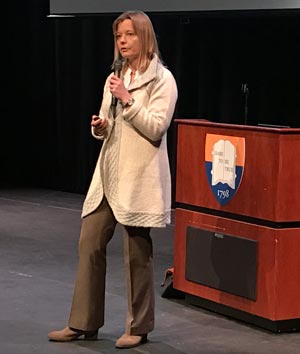 Victories in pharmaceutical research may be life-changing, or they may be very small. Just four stairs, climbed by a child with Duchenne muscular dystrophy (DMD), are motivation for Dr. Angelika Fretzen to continue pursuing a drug to regenerate muscle and lessen the effects of the devastating genetic illness.
Victories in pharmaceutical research may be life-changing, or they may be very small. Just four stairs, climbed by a child with Duchenne muscular dystrophy (DMD), are motivation for Dr. Angelika Fretzen to continue pursuing a drug to regenerate muscle and lessen the effects of the devastating genetic illness.
Her company, Catabasis Pharmaceuticals, measured a 4-step climb as a timed function test and it improved numerically for the boys in the MoveDMD trial. The ability to climb four stairs means a child can board a school bus, which is why it is so meaningful to the patients and their parents. “Hearing something like that makes my heart leap,” Dr. Fretzen, senior vice president of product development at Catabasis, told students at this year’s Science Assembly.
The victories, as well as the failures, of scientific exploration have enthralled Dr. Fretzen since she was a young student. Though she never imagined she’d work in drug research, she is grateful she discovered her love of chemistry early.
“If you are open to finding what fascinates you, what will grow into a passion over the years of your life, the next steps will come to you,” she said. “You don’t know exactly what those next steps are going to be, but discovering that passion is perhaps the most important thing you could do at this stage in your life.”
DMD causes muscle degeneration and weakness, affecting boys in the vast majority of cases, and diagnosed sometimes as early as 3 years old. The disease comes with a bleak prognosis: as patients’ muscles break down, their motor functions become more and more limited until they can no longer breathe on their own. The life expectancy for a patient with DMD is typically into their 20s or 30s. Currently, muscle degeneration is somewhat slowed by steroids—which have unpleasant physical and behavioral side effects—used alongside a new drug called Exondys 51.
Researchers at Catabasis, a small Cambridge pharmaceutical company, completed the second round of a clinical trial in which some children were given edasalonexent, the drug in development, from the start of the trial and others began with a placebo (those who received the placebo at first were started on edasalonexent after 12 weeks). Though the research showed some trends toward improved muscle function, as with the ability to climb stairs, ultimately the changes were not statistically significant. The families’ determination throughout the trial is reason to keep pushing for an effective drug, Dr. Fretzen said.
“For parents of children with Duchenne, it’s agony—you know what’s coming for your child,” she said, noting that some parents have more than one child with DMD. “It’s sometimes important to be reminded how lucky we are. That’s why I get up in the morning to do this work.”
Prior to joining Catabasis, Dr. Fretzen was vice president of pharmaceutical chemistry and development at Ironwood Pharmaceuticals, where she led the development and approval process for the irritable bowel syndrome drug Linzess. She was an Alexander von Humboldt Fellow in the Department of Chemistry and Chemical Biology at Harvard University. She holds a Diploma (M.S.) in chemistry from the University of Würzburg in Germany and her Ph.D. in organometallic and synthetic organic chemistry from the University of Geneva, Switzerland. Dr. Fretzen also has an MBA from Suffolk University in Boston.